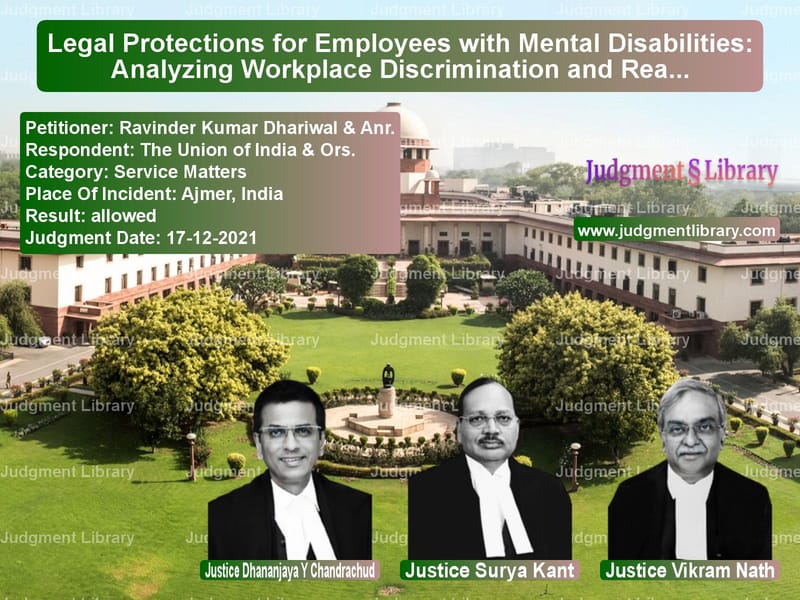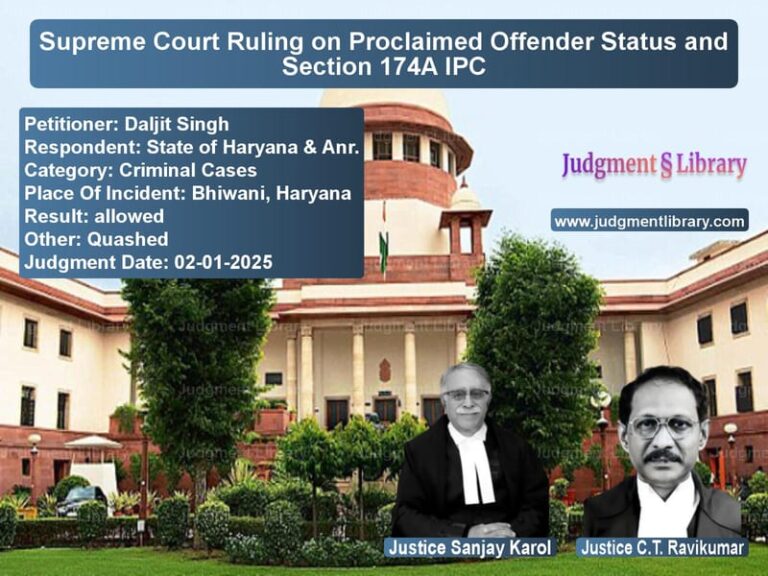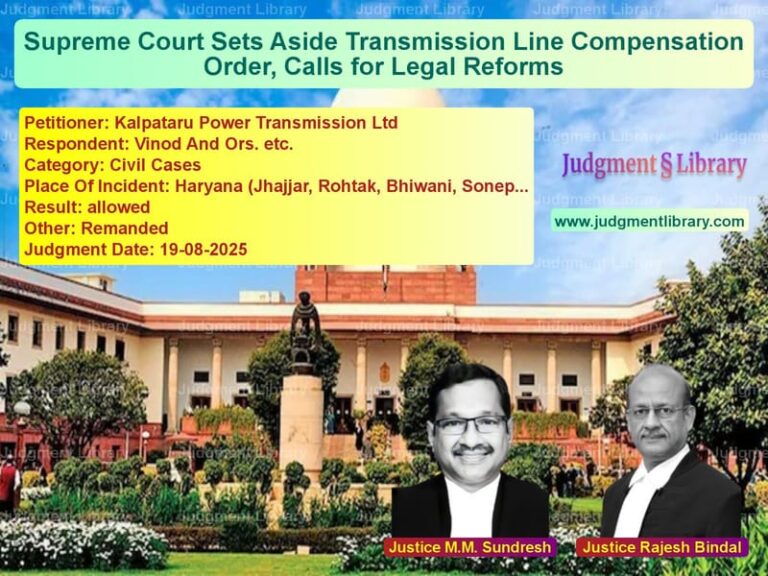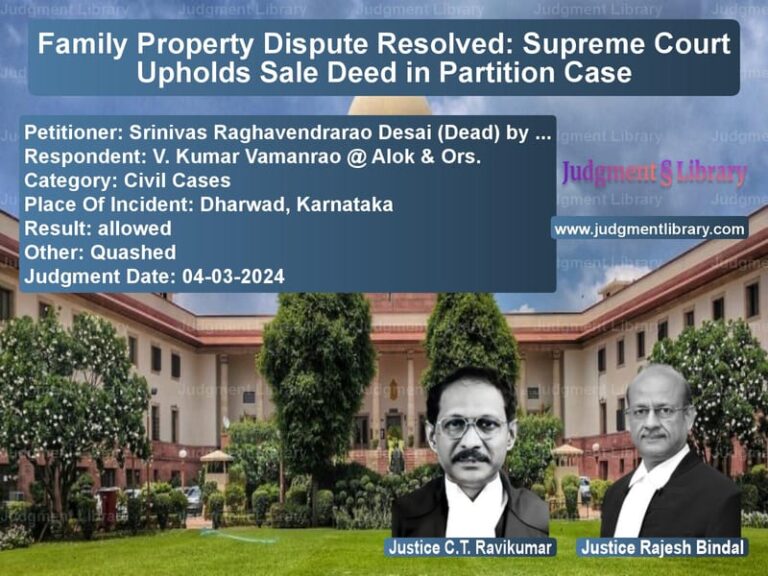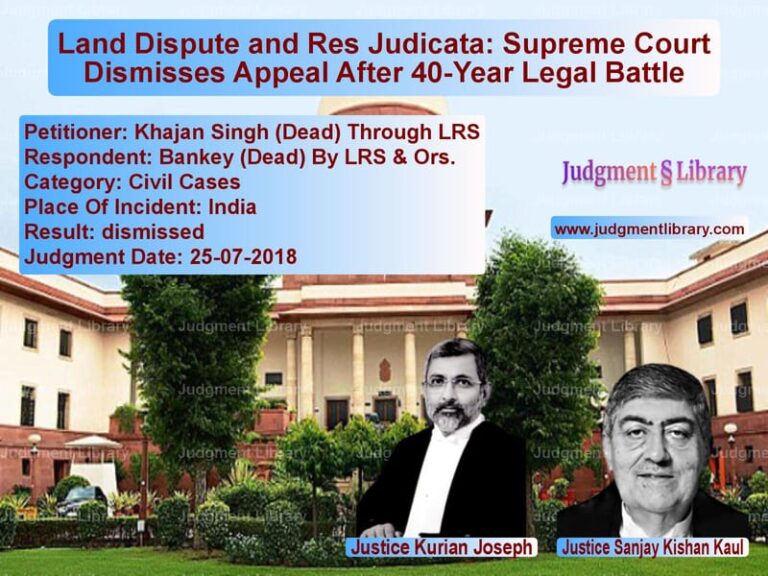Legal Protections for Employees with Mental Disabilities: Analyzing Workplace Discrimination and Reasonable Accommodation
The case of Ravinder Kumar Dhariwal & Anr. v. The Union of India & Ors. delves into critical questions regarding employment rights for individuals with disabilities, particularly those experiencing mental health conditions. The case examines the disciplinary proceedings against an officer of the Central Reserve Police Force (CRPF) and their compliance with disability rights laws.
The appellant, a CRPF officer, was diagnosed with mental health disorders, including obsessive-compulsive disorder (OCD) and major depressive disorder, due to prolonged service in high-stress zones. Despite medical evidence proving a disability percentage between 40 to 70%, disciplinary proceedings were initiated against him for alleged misconduct. The Supreme Court’s judgment provides a detailed analysis of legal protections under the Persons with Disabilities (Equal Opportunities, Protection of Rights and Full Participation) Act, 1995 (PwD Act) and the subsequent Rights of Persons with Disabilities Act, 2016 (RPwD Act).
Background of the Case
The appellant served in various conflict-ridden regions and, over time, developed mental health issues. In 2010, a complaint was filed against him, citing erratic behavior, including threats to harm himself or others. Subsequent departmental inquiries charged him with misconduct, including absenteeism and insubordination.
Despite medical records confirming his psychiatric condition, the CRPF proceeded with disciplinary actions without considering the disability framework. The case was initially heard by the Gauhati High Court, where the Single Judge ruled in favor of the appellant, citing protections under Section 47 of the PwD Act. However, the Division Bench overturned this decision, leading to an appeal before the Supreme Court.
Legal Issues Considered
The Supreme Court examined the following key legal aspects:
- Whether the appellant was entitled to protection under the PwD Act and later the RPwD Act.
- Whether disciplinary proceedings against an individual with a documented mental health condition constitute discrimination.
- Whether the CRPF was justified in continuing with disciplinary proceedings despite evidence of mental disability.
Key Legal Arguments
Arguments by the Appellant
The appellant contended:
- He had been diagnosed with mental health disorders due to prolonged service in conflict zones.
- His conduct, which led to the disciplinary proceedings, was directly linked to his disability.
- Under Section 47 of the PwD Act and later Section 20 of the RPwD Act, he could not be dismissed, demoted, or denied reasonable accommodation.
- The CRPF failed to make reasonable accommodations, including offering a transfer to a post suited to his medical condition.
Arguments by the Respondents
The CRPF contended:
- The appellant’s conduct posed a direct threat to the safety of others, justifying disciplinary action.
- He had not previously raised the defense of mental illness during the initial stages of the inquiry.
- The exemption notification under the PwD Act allowed the CRPF to terminate personnel on disciplinary grounds.
Supreme Court’s Analysis and Judgment
Non-discrimination and the Right to Reasonable Accommodation
The Court examined whether the exemption granted to CRPF under the PwD Act continued under the RPwD Act. It held that the 2002 notification exempting CRPF from Section 47 protections was not applicable under the RPwD Act.
The Court also reaffirmed the principle that disability discrimination includes indirect discrimination, wherein a seemingly neutral policy disproportionately affects persons with disabilities.
International and Comparative Legal Perspective
The judgment discussed international jurisprudence, including decisions from the United States, Canada, South Africa, and the European Union, to emphasize the global recognition of workplace accommodations for employees with mental health conditions. The Court highlighted that:
- The Americans with Disabilities Act (ADA) mandates reasonable accommodation unless an undue hardship is proven.
- Canadian courts recognize that employees with mental health disorders should not face punitive measures solely based on conduct linked to their disability.
- South African law mandates that disability-related misconduct be assessed under incapacity proceedings rather than disciplinary mechanisms.
The Court’s Verdict
The Supreme Court ruled in favor of the appellant, holding that:
- The disciplinary proceedings against him were discriminatory.
- The CRPF failed to consider reasonable accommodations.
- The appellant must be reassigned to a suitable post without loss of pay or benefits.
- There should be no handling of firearms or high-risk assignments in his new role.
Implications of the Judgment
This ruling reinforces the obligation of government establishments to provide reasonable accommodations for employees with disabilities. It also establishes that disciplinary proceedings cannot be used as a pretext to dismiss individuals whose conduct is linked to their disability.
By setting a precedent for recognizing mental health disabilities as a legitimate ground for workplace protections, this decision paves the way for stronger disability rights enforcement in India.
Petitioner Name: Ravinder Kumar Dhariwal & Anr..Respondent Name: The Union of India & Ors..Judgment By: Justice Dhananjaya Y Chandrachud, Justice Surya Kant, Justice Vikram Nath.Place Of Incident: Ajmer, India.Judgment Date: 17-12-2021.
Don’t miss out on the full details! Download the complete judgment in PDF format below and gain valuable insights instantly!
Download Judgment: ravinder-kumar-dhari-vs-the-union-of-india-&-supreme-court-of-india-judgment-dated-17-12-2021.pdf
Directly Download Judgment: Directly download this Judgment
See all petitions in Workplace Harassment
See all petitions in Employment Disputes
See all petitions in Termination Cases
See all petitions in Public Sector Employees
See all petitions in Disciplinary Proceedings
See all petitions in Judgment by Dhananjaya Y Chandrachud
See all petitions in Judgment by Surya Kant
See all petitions in Judgment by Vikram Nath
See all petitions in allowed
See all petitions in supreme court of India judgments December 2021
See all petitions in 2021 judgments
See all posts in Service Matters Category
See all allowed petitions in Service Matters Category
See all Dismissed petitions in Service Matters Category
See all partially allowed petitions in Service Matters Category

